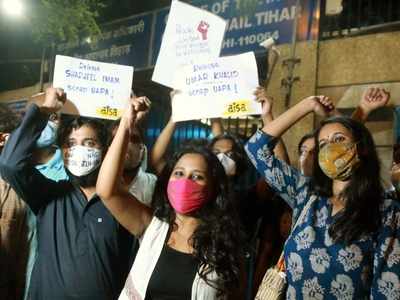- News
- India News
- 3 activists walk free on HC’s prod, 48 hours after bail order
Trending
This story is from June 18, 2021
3 activists walk free on HC’s prod, 48 hours after bail order
It took a second intervention in less than 48 hours by the Delhi HC to finally ensure Jamia student Asif Iqbal Tanha and JNU’s Devangana Kalita and Natasha Narwal were released from Tihar jail on Thursday. Despite getting bail from the HC on Tuesday, the trio, who had been arrested in May last year under the stringent Unlawful Activities (Prevention) Act (UAPA) in the northeast Delhi riots conspiracy case, had to remain behind bars.

Student activists Natasha Narwal, Asif Iqbal Tanha and Devangana Kalita outside Tihar prison, after a court ordered their immediate release in the north-east Delhi riots 'conspiracy' case.
Despite getting bail from the HC on Tuesday, the trio, who had been arrested in May last year under the stringent Unlawful Activities (Prevention) Act (UAPA) in the northeast Delhi riots conspiracy case, had to remain behind bars with Delhi Police raising a red flag on verification of address of the accused and Aadhar cards of the persons who stood surety for them.

At one stage, the prosecution claimed a cop will go to Assam by train Thursday evening from Delhi, verify the permanent address of one of the accused and return to apprise the court. Teams also had to go to Jharkhand for the purpose.
But a bench of Justices Siddharth Mridul and Anup J Bhambhani made it clear in the morning session itself it expected trial judge Revinder Bedi to decide with “promptitude” and “expeditiously” the issue of the release of the three from jail.
Just after being freed from the jail, Kalita told the press, “The government is trying to suppress the voice of people and dissent… it (delaying the trio’s release) shows the desperation”. Tanha said, “I hope this judgement will serve as an important precedent. Our fight against CAA, NRC and NPR will continue”. Narwal said, “the order restores our faith in the Indian judiciary that they would stand for the rights of the people and democratic dissent in this country”.
The matter had reached the HC again Thursday as the jailed students moved an urgent plea saying that even after 36 hours of passing of the bail orders it is not being implemented. Since the trial court was to also take up the matter, the HC asked the counsels for the accused and police to appear before the trial court at noon and apprise it of HC’s directions. The bench said it would take up the plea again at 3.30pm.
Meanwhile, the trial court ordered immediate release of trio, noting that delay in the verification process by the police cannot be a plausible reason for the accused to be kept imprisoned. Additional sessions judge Revinder Bedi also pulled up police for delay in verification of addresses and sureties noting that "this by itself cannot be a plausible reason for the accused to be kept imprisoned till the time such reports are filed".
Taking note of the undertaking given by the counsel of the accused that their client will not leave the jurisdiction of the national capital, the court sent the warrant to the superintendent of the Tihar Jail for their immediate release.
A day after HC ordered immediate release on bail, police had moved an application seeking more time from the court to verify their addresses, sureties and authenticity of the Aadhaar cards before releasing the accused on bail.
Dismissing the prosecution application, the judge directed them to verify the addresses of the accused in Delhi and submit the report on Thursday itself by 5pm.
ASJ Bedi cited the high court’s observations that once the incarcerated have been ordered to be released on bail and furnished the bail bond with sureties, they ought not to remain behind bars "even for a minute".
The court said that the "State should ensure the infrastructure necessary for such verification process within minimum possible time and there cannot be any reason, sufficient enough to deny such a person his liberty."
Later in HC, the lawyers informed the bench that the trial court has ordered "'immediate release" of the accused. The HC re-iterated "once the trial court has issued release orders to the jail superintendent, that is the end of the matter. Nothing more needs to be done."
End of Article
FOLLOW US ON SOCIAL MEDIA










